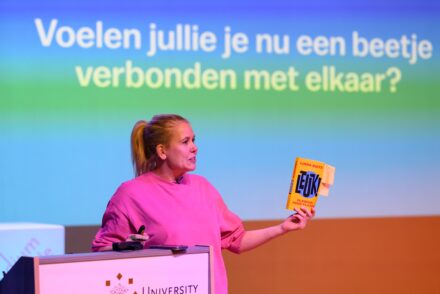‘Our freedom exists by the grace of public debate,’ says Professor of Constitutional Law Ingrid Leijten about the asylum crisis
The strictest asylum policy ever. The Dutch right-wing party PVV wants to keep that election promise now that it is actually in power. With an emergency law, the party wanted to sideline parliament. A risky political game, says Professor of Constitutional Law Ingrid Leijten. ‘That’s how you damage the image we have of the rule of law.’

In the political arena The Hague these weeks, scenes from a movie like Pearl Harbor are taking place, in which planes head straight for each other. Whoever steers away first from a fatal collision is a coward or ‘chicken’. In Dutch politics it’s a game between the PVV and the rest of the country. Minister Faber and her party leader Geert Wilders are not only playing high stakes with coalition partner NSC, but also with the rest of the coalition, parliament and all advisory councils and experts in the field of constitutional law.
‘An emergency law is intended for emergencies in which a vital interest is at stake, for example when half the country is under water or during a war or pandemic,’ says Ingrid Leijten, professor of Dutch and European constitutional law at Tilburg University. ‘In such cases, there is no time to make a law first and the government has to deviate from the rules that we have all democratically agreed upon.’
But the country is in an acute crisis due to its asylum and migration policy, claims the ruling party PVV. That is why ‘extraordinary measures’ are needed, which call for swift action with emergency legislation. This is the argument of Minister Marjolein Faber (PVV) of Asylum Policy, who did not know where to go for weeks and pushed for a tough confrontation with both Houses.
Dangerous politics
Last week, a majority of the Senate spoke out against Faber’s emergency law. Senator Paul Rosenmöller of leftwing party GroenLinks-PvdA calls Faber and Wilders’ argument “an extraordinarily risky and, frankly, dangerous political argument.”
And then such a law also goes to the Council of State, which gives an advice. ‘That’s the rule of law,’ says Leijten. ‘Our rule of law is designed in such a way that power does not lie solely with Minister Faber or only with the Schoof cabinet, but that it is in several hands.’
Alternative
It seems that the PVV wants to take all the power to itself. It is not clear what the party wants to achieve with this. With an emergency law, Faber can temporarily suspend the current Vreemdelingenwet, or Asylum Act, but even then the cabinet will have to account for it afterwards. ‘Those emergency measures are going to run aground somewhere. The government could introduce them, but somewhere in the process you run into problems,’ Leijten says.
It probably won’t come to that now, because the PVV seems to steer away from a direct confrontation. The party is negotiating other asylum options. There is now talk of an ‘spoedwet’, an accelerated procedure within the constitutional boundaries of the ordinary legislation.
Such a ‘spoedwet’ can be put into effect much more quickly than an ordinary law, but it must first go through the appropriate advisory bodies and parliament. Faber is not in favour of this, because the leeway she has to sideline parts of the Asylum Act will be a lot smaller with an ‘spoedwet’.
The PVV continues to exert maximum pressure on asylum policy, hoping to force concessions from coalition partners. Faber’s collision course, meanwhile, is doing Wilders’ party no harm in the polls. For now, voters continue to support the party’s tough talk.
Public debate
It is a risky game that the PVV is playing with constitutional relations, Leijten observes. ‘I understand that people sometimes want to see political action sooner. You also see that young people are more likely to say: give me that strong leader who hits the nail on the head. But an autocrat who puts democracy aside for a moment? You just shouldn’t want that,’ the professor says firmly.
‘We have different parties in our parliament that represent all the different interests of groups of people in our country. And it is so important that there is discussion there, in parliament,’ Leijten emphasizes. ‘Our freedom exists by the grace of public debate.’
Damage
Well, the PVV, in the person of Geert Wilders, has a long tradition in the field of kicking against institutions. He called the people’s parliament a ‘fake parliament’ and scolded ‘D66 judges’ who condemned his statements, D66 being his favorite scapegoat as a moderate party of the political center.
But what damage will the rule of law suffer now that his party is also in government? ‘I don’t know what’s going to happen, but if you smear or sideline the other actors, you damage the image we have of the rule of law.’
Leijten does not dare to say whether this damage will be permanent: ‘It is a wild guess, but I hope that the dissent in our country is strong enough. That the opposing forces can provide more balance, before ‘accidents’ happen. And that people will start to see that this is not the direction we want to go.’






